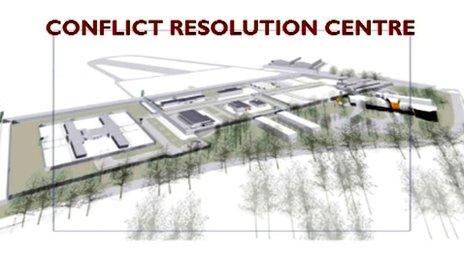Maze conflict centre no IRA shrine says Donaldson
- Published

The Conflict Resolution Centre will be part of a £300m redevelopment of the site of the Maze prison
A conflict resolution centre to be built on the site of the former Maze prison will be no shrine to IRA terrorism, Jeffrey Donaldson has said.
He was speaking as European funding of £18m was approved for a peace building on the grounds of the former H-blocks.
The prison was the focus for the world's media during the republican hunger strikes in which 10 men died.
The choice of the Maze site for a conflict resolution centre has been strongly criticised by some unionists.
They believe that it is too much part of the fabric of republican history.
However Mr Donaldson, the DUP MP for Lagan Valley, firmly rejected such criticism.
"It is going to be a new purpose-built building on the Maze site. It is not in an H-block, it is going to be in a new build," he told the BBC's Good Morning Ulster.
"This is a small part of the overall Maze site which will be developed for a number of other purposes - indeed, the Royal Ulster Agriculture Society is planning to relocate there."
Mr Donaldson said there had been wide consultation on the issue with a range of people, including those from government and ex-military backgrounds as well as victims.
"I know a lot of Protestants who would support this on the basis of what has been agreed. It is about promoting dialogue and it is a way forward," he said.
"I would also like to see the Maze site developed. I represent people who live in that area. There is high unemployment. They want to see the government getting on with this.
"Contrary to the view that this will be divisive, when people see the detail, it will reassure them. Far from it being seen as a shrine, it is about looking to the future. The peace building centre can help us look and focus towards the future."
The peace building project is set to be confirmed in the coming weeks as part of a £300m redevelopment of the 350-acre site near Lisburn.
Toxic
However, Ulster Unionist Mike Nesbitt disagreed with Mr Donaldson.
He said that his party feared that Maze would turn out like the Boston College, external Belfast Project which is now at the centre of a legal wrangle over controversial interviews given by former paramilitaries.
"It would become toxic," Mr Nesbitt said.
"What will happen if we go ahead with this is that a large section of the community from the Protestant/Unionist side will not only feel they cannot support it, they will build their own conflict centre. We will continue to have a shared-out - rather than a shared - future.
"Our difficulty is that we do not agree about anything in terms of the past. All we can do is ensure that everyone can buy in and tell their versions of the story."
Sinn Fein MLA Raymond McCartney welcomed progress on the development of the site.
"The redevelopment of the Long Kesh site will not only create jobs but will also be a shining example of how the North accepts diversity," he said.
"The building of a conflict resolution centre will see it becoming a venue for assisting other troubled parts of the world and also a resource for those researching the Irish peace process.
"This funding will, I believe, kick-start the process of transforming the former Long Kesh site into an asset that will serve all the people in the years ahead, not only in providing a first class facility in conflict resolution and tourist attraction but also as an economic driver in the Lisburn area."
Since the Maze closed 12 years ago there has been a constant debate about how the extensive site should be used.
It was ear-marked for a new national sports stadium but the proposal was rejected after years of disagreement.
The conflict resolution centre will provide a place for visitors from around the world to exchange views on conflict transformation, a focus for education and research about the troubles together with exhibition space and an archive.
It is envisaged there will be input from ex-prisoners, prison officers and victims.
The centre will sit alongside a preserved H block and other buildings, including the chapel and the hospital where the hunger strikers died.
Ten members of the IRA and INLA died on hunger strike in the Maze in 1981 and it was also the scene of their 'dirty protest'. Thirty-eight IRA prisoners also took part in the largest prison escape in British history in 1983.
- Published2 February 2012
- Published29 July 2010